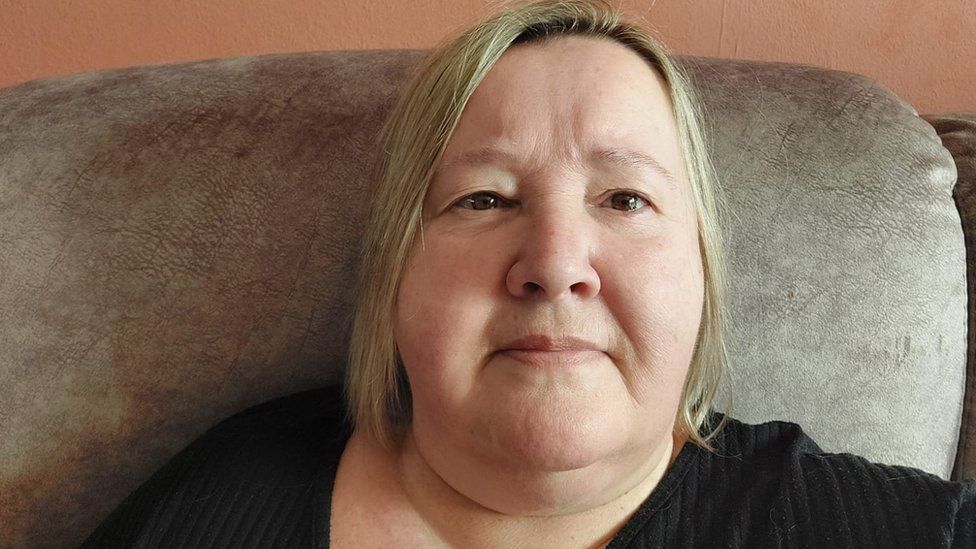Long Covid: University of East Anglia study finds women more likely affected
- Published

Women are more likely to suffer from long Covid but being vaccinated almost halves the risk of developing the condition, a University of East Anglia study has found. But what does long Covid mean for those living with the illness?
Wendy Brett, 54, was working as a hospital discharge officer on a Covid ward when she caught the virus in January 2021.
"I've not been able to work since and I'm pretty much housebound," she says.
Wendy is one of more than two million people in the UK who have symptoms of long Covid.
"I suffer from insomnia, chronic fatigue and breathlessness and I can't stand up for longer than 10 to 15 minutes.
"I'm on sick leave but I'm probably going to lose my job in the next few months."
Wendy, who lives in Baldock in Hertfordshire, was overweight and suffered from depression before she got Covid. Both conditions have worsened since she caught the virus, she says.
She has also recently developed type 2 diabetes and is now on beta blockers.
Wendy ended up in hospital twice for her initial Covid infection, which she contracted just days after her first vaccination but before she was able to get her second jab.
Now discharged from a long Covid clinic, she is currently waiting for support from a fatigue management clinic.
The University of East Anglia (UEA) looked at more than 860,000 patients for the study, which is thought to be the largest of its kind.
Overweight people, those aged over 40, smokers and patients with asthma, diabetes, heart disease, anxiety, depression are also more likely to experience the condition, the study says.
Prof Vassilios Vassiliou, from UEA's Norwich Medical School and honorary consultant cardiologist at the Norfolk and Norwich University Hospital, looked at data from 41 studies to find out the factors making people more susceptible to the condition.
The risk of getting long Covid was reduced by 43% with a vaccination, the research found, while people who ended up in hospital during their initial infection were also more at risk.
"These findings are important because they enable us to better understand who may develop long Covid and also advocate for the benefit of vaccination," Prof Vassiliou said.
Dr Eleana Ntatsaki, from UCL and Ipswich Hospital, who co-wrote the study, added: "We can now better understand and serve this population with long term care planning, support for long Covid clinics and increase awareness of the prevalence and impact of the condition."
'l feel like I'm invisible'
Jane Henfrey, 64, from Saffron Walden in Essex, caught coronavirus in May 2020, before vaccines were available.
She was a private tutor, teaching English, but has given up work and started claiming benefits due to long Covid.
"My life has absolutely changed, l feel like I'm invisible and the rest of the world is going on without me," she says.
She was diagnosed with myalgic encephalomyelitis, also called chronic fatigue syndrome or ME, last May. Her main symptom is "extreme debilitating fatigue", Jane says, as well as headaches that mean she can't read a book, watch TV or hold a conversation for long.
Jane had thyroid disease and anaemia before she caught Covid but says she was coping well and her business was thriving.
"Now I can't go for walks and would need a wheelchair to go anywhere but I feel too unwell most of the time to leave the house.
"I have to depend on my son who lives with me to do the cleaning and cooking - I totally depend on him and he is a godsend."
'My old life consisted of being active'
Annette Shelford, 51, from Cambridge, fell sick with Covid three years ago - similarly before vaccines were available - and says her life has been miserable ever since.
The former fitness instructor has been left with severe gastro-intestinal problems and has to use a wheelchair.
Annette also worked as a science learning consultant but has had to leave her job due to her symptoms which include "overwhelming fatigue".
"I have pretty much no hope for the future. My old life consisted of being active and economically independent but both of those things have been taken from me," she says.
The team behind the UEA study, published in the journal JAMA Internal Medicine, hope it will help people better understand the condition, increase awareness and lead to more support for patients like Wendy, Jane and Annette.
Prof Vassiliou also hopes it will encourage people to minimise the risk factors they can control - like losing weight, stopping smoking and getting vaccinated.
Next he wants to look into whether repeated vaccinations further protect people from long Covid and if they have a particular effect on individuals from an afro-Carribean origin, for example, or a European origin.
"This paper is a start point for all of us to look in the mirror and say 'can we start living a healthier lifestyle tomorrow'," he adds.
Find BBC News: East of England on Facebook, Instagram and Twitter. If you have a story suggestion email eastofenglandnews@bbc.co.uk
- Published30 January 2023
- Published26 December 2021
- Published10 March 2022
- Published9 January 2023
- Published31 January 2023